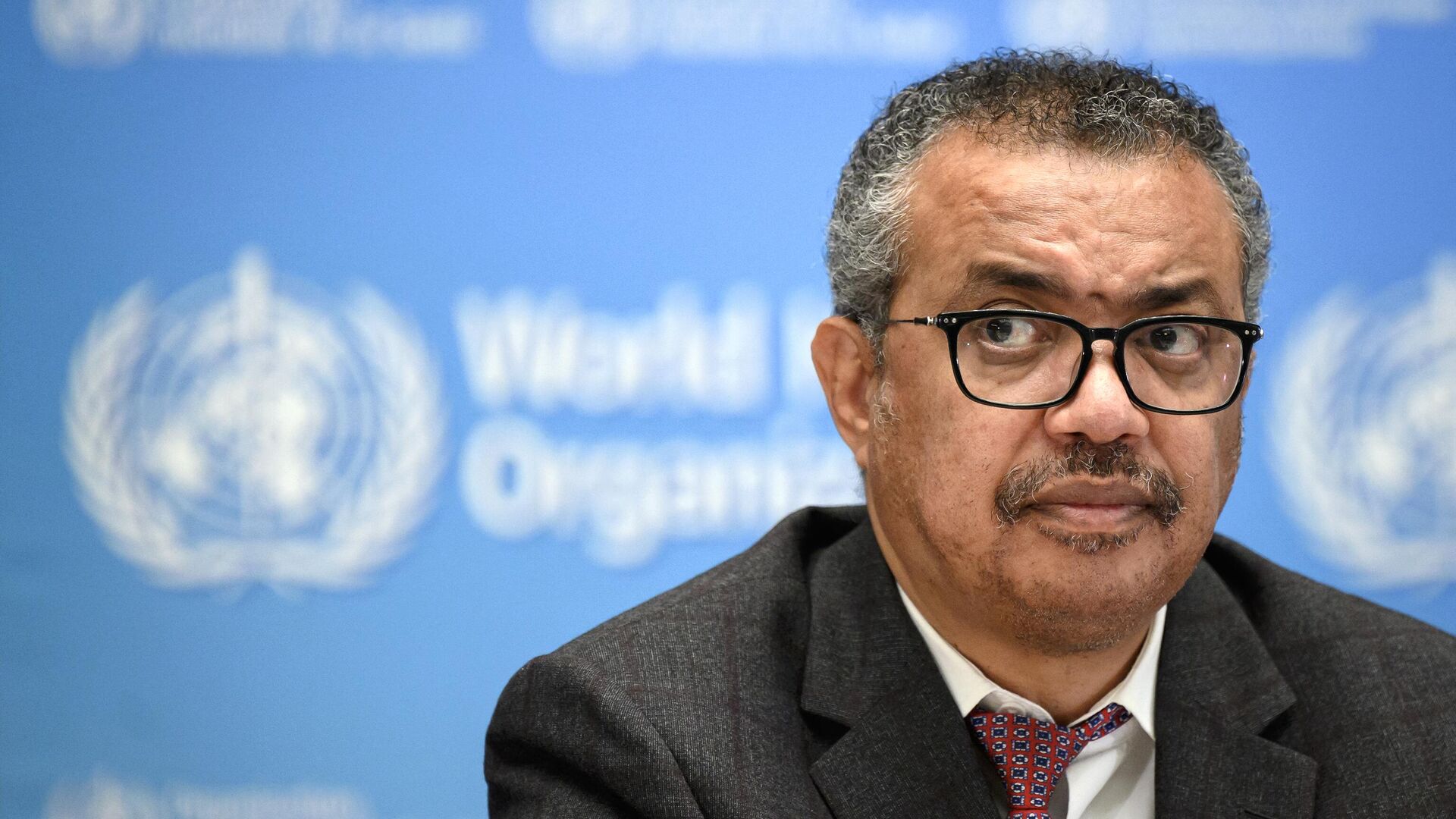https://sputnikglobe.com/20220414/who-head-intl-community-treats-crises-in-ukraine-and-ethiopia-differently-due-to-racism-1094763669.html
WHO Head: Int'l Community Treats Crises in Ukraine and Ethiopia Differently Due to Racism
WHO Head: Int'l Community Treats Crises in Ukraine and Ethiopia Differently Due to Racism
Sputnik International
Tedros Adhanom Ghebreyesus, who is from Tigray Region (a conflict-ridden zone in Ethiopia), has frequently criticised the war and the humanitarian crisis in... 14.04.2022, Sputnik International
2022-04-14T14:53+0000
2022-04-14T14:53+0000
2022-11-23T11:38+0000
world health organization (who)
tedros adhanom ghebreyesus
africa
eritrea
ethiopia
east africa
https://cdn1.img.sputnikglobe.com/img/07e6/04/0e/1094763952_0:160:3073:1888_1920x0_80_0_0_7c46df55a781c107cea89878f180ab03.jpg
World Health Organisation (WHO) Director-General Tedros Adhanom Ghebreyesus has asserted that the world does not treat different global crises equally because of racism, saying that the Ukrainian crisis is receiving the lion's share of media attention while the one in Tigray is being downplayed.According to the WHO head, "the world is not treating the human race the same way" and "some are more equal than others".He said that despite the truce declared in Tigray some three weeks ago, the region is still facing humanitarian problems and de-facto remains under "siege by the Ethiopian and Eritrean forces".While the UN said that at least 2,000 trucks carrying essential humanitarian aid should have entered the region, Tedros pointed out that only 20 have made it so far, and even this number could be just "a diplomatic manoeuvre" by Addis Ababa.Despite acknowledging the global significance of the conflict in Ukraine, Tedros said that he still hopes that the international community would "come back to its senses and treat all human life equally".The UN has warned that 83 percent of people in Tigray region are food insecure after months-long war, with at least three-quarters of families experiencing a severe lack of food.The Ethiopian military forces under Prime Minister Abiy Ahmed and the Tigray People’s Liberation Front clashed in an armed conflict in November 2020, with a ceasefire being declared in late March 2022. The truce had three conditions: that attacks on the Ethiopian forces must stop, that the TPLF must withdraw into Tigray state, and that it must recognise the legitimacy of Ahmed's government. Assuming office in 2018, Abiy was the one who formally finished the war with Eritrea that began 20 years ago. This did not sit well with the TPLF; the group defied his government before carrying out its attack in November 2020.
africa
eritrea
ethiopia
east africa
Sputnik International
feedback@sputniknews.com
+74956456601
MIA „Rossiya Segodnya“
2022
Sputnik International
feedback@sputniknews.com
+74956456601
MIA „Rossiya Segodnya“
News
en_EN
Sputnik International
feedback@sputniknews.com
+74956456601
MIA „Rossiya Segodnya“
Sputnik International
feedback@sputniknews.com
+74956456601
MIA „Rossiya Segodnya“
world health organization (who), tedros adhanom ghebreyesus, eritrea, ethiopia, east africa
world health organization (who), tedros adhanom ghebreyesus, eritrea, ethiopia, east africa
WHO Head: Int'l Community Treats Crises in Ukraine and Ethiopia Differently Due to Racism
14:53 GMT 14.04.2022 (Updated: 11:38 GMT 23.11.2022) Tedros Adhanom Ghebreyesus, who is from Tigray Region (a conflict-ridden zone in Ethiopia), has frequently criticised the war and the humanitarian crisis in Ethiopia. His criticism even prompted condemnation from the Ethiopian government, which denounced him for using his office to advance his own political stance at the expense of Addis Ababa.
World Health Organisation (WHO) Director-General Tedros Adhanom Ghebreyesus has asserted that the world does not treat different global crises equally because of racism, saying that the Ukrainian crisis is receiving the lion's share of media attention while the one in Tigray is being downplayed.
"I don't know if the world really gives equal attention to black and white lives," Tedros told a news conference on Wednesday. "The whole attention to Ukraine is very important of course, because it impacts the whole world. But even a fraction of it is not being given to Tigray, Yemen, Afghanistan and Syria and the rest."
According to the WHO head, "the world is not treating the human race the same way" and "some are more equal than others".
He said that despite
the truce declared in Tigray some three weeks ago, the region is still facing humanitarian problems and de-facto remains under "siege by the Ethiopian and Eritrean forces".
While the UN said that at least 2,000 trucks carrying essential humanitarian aid should have entered the region, Tedros pointed out that only 20 have made it so far, and even this number could be just "a diplomatic manoeuvre" by Addis Ababa.
“As we speak, people are dying of starvation,” the WHO chief said, going on to accuse the media of failing to document the atrocities committed in Ethiopia. "To avert the humanitarian calamity and hundreds of thousands more people from dying, we need unfettered humanitarian access from those reinforcing the siege."
Despite acknowledging the global significance of the conflict in Ukraine, Tedros said that he still hopes that the international community would "come back to its senses and treat all human life equally".
The UN has warned that 83 percent of people in Tigray region are food insecure after months-long war, with at least three-quarters of families experiencing a severe lack of food.
The Ethiopian military forces under Prime Minister Abiy Ahmed and the Tigray People’s Liberation Front clashed in an armed conflict in November 2020, with a ceasefire being declared in late March 2022. The truce had three conditions: that attacks on the Ethiopian forces must stop, that the TPLF must withdraw into Tigray state, and that it must recognise the legitimacy of Ahmed's government.
Assuming office in 2018, Abiy was the one who formally finished the war with Eritrea that began 20 years ago. This did not sit well with the TPLF; the group defied his government before carrying out its attack in November 2020.


